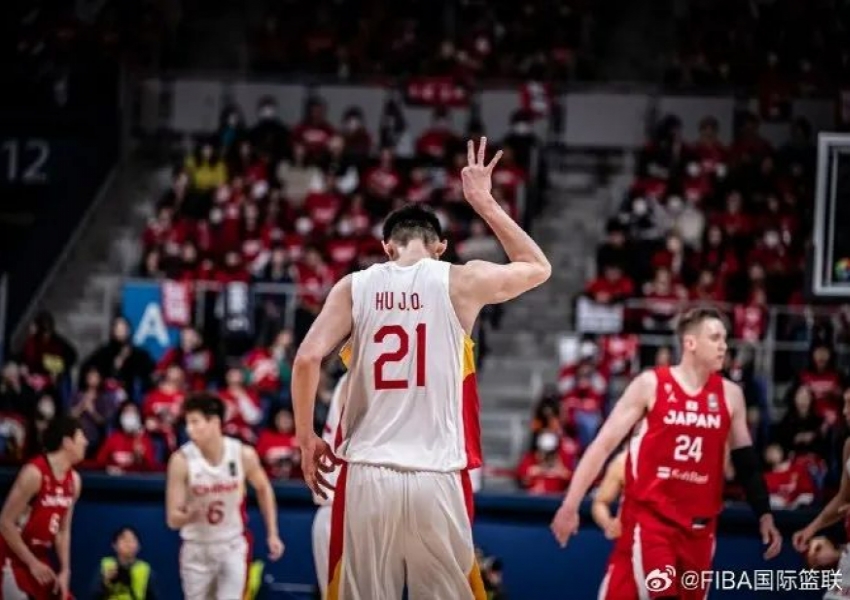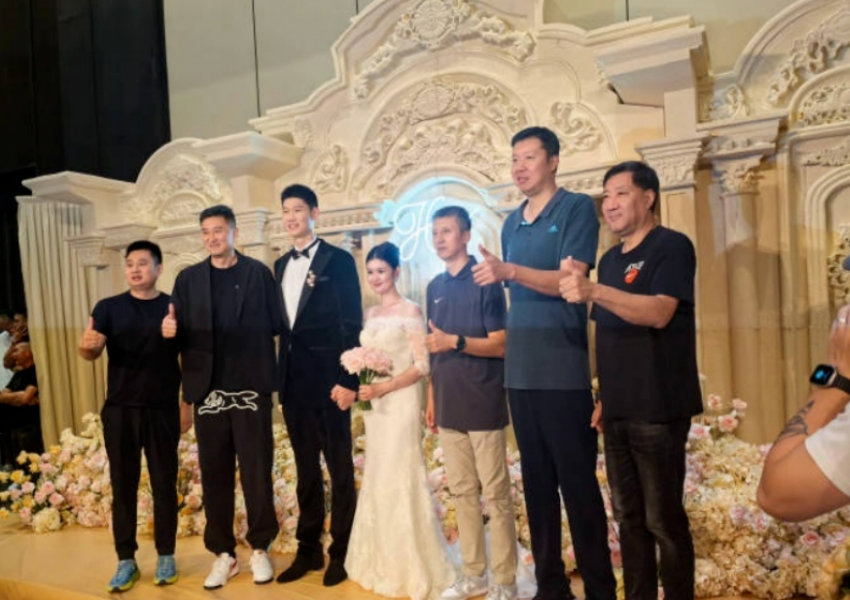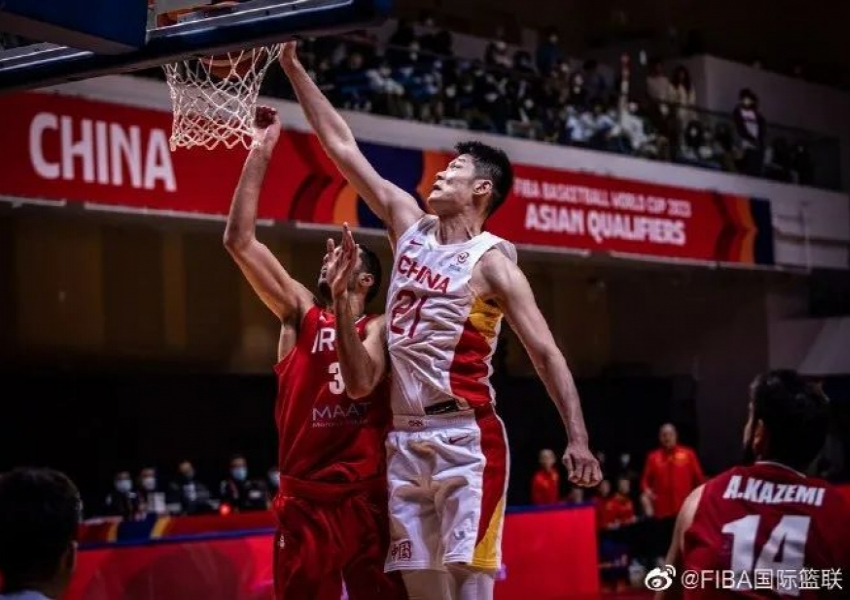He’s Married! Hu Jinqiu Scores 42 Points and 22 Rebounds in Asian Qualifiers – Is He the Future of China’s Frontcourt?
Hu Jinqiu, one of the most crucial figures in Chinese basketball today, has recently added another major milestone to his life—his wedding. The second game between the Chinese national basketball team and Joventut Badalona had fans scratching their heads when Hu suddenly didn’t play. The reason? He had to head back for his wedding ceremony, a much-anticipated event that had been delayed for quite some time due to his national team commitments.

The wedding was attended by several key figures in Chinese basketball, including Du Feng, Guo Shiqiang, and Wang Zhizhi, who all came to celebrate with the happy couple. Hu and his wife had actually been legally married for a while and already have two children. However, due to the demands of national duties and other special circumstances, the formal celebration was pushed to the present.

Interestingly, Hu could have skipped this summer’s grueling long-term training sessions with the Chinese national team to spend more time with his family and focus on the wedding. But being the consummate professional he is, Hu chose to participate in the training camp and even played in the first game against Joventut Badalona just two days before his wedding. In that game, he logged eight minutes, scoring two points and grabbing four rebounds, including some crucial offensive boards.

Hu Jinqiu: The Heart of China’s Frontcourt
Hu Jinqiu’s dedication to both his personal and professional life reflects the character of a player who has become an indispensable part of China’s national team. Over the past few years, he’s been one of the busiest players on the roster, consistently stepping up when needed. Last year’s FIBA World Cup was a prime example of his importance. Playing an average of 18.9 minutes per game, Hu contributed 9.3 points, 3 rebounds, and 1.3 assists, with an impressive 70% shooting from the field. One of his standout performances came in China’s lone victory against Angola, where Hu dropped 20 points, grabbed three rebounds, and dished out two assists.
Since the 2023 Hangzhou Asian Games, Hu has essentially taken over the role that used to belong to Zhou Qi as China’s premier interior player. In that tournament, Hu averaged 12 points, 5.2 rebounds, and 1.3 assists per game, with a staggering 71% shooting percentage, making him the team’s leading scorer.
Earlier this year, in February’s Asian Qualifiers, Hu continued to solidify his status as the core of China’s frontcourt. He was unstoppable in matchups against Mongolia and Japan, putting up 19 points and 9 rebounds in a win against Mongolia and following that with 23 points and 13 rebounds in a tough loss to Japan. Across both games, Hu combined for 42 points and 22 rebounds, establishing himself as China’s most consistent and reliable player throughout the tournament.
The Controversial Use of Hu at the 5-Spot
Despite his strong performances, there has been some debate about how various coaches, from Aleksandar Đorđević to Guo Shiqiang, have utilized Hu Jinqiu. At 6'9" (2.06 meters) and with the skillset of a modern-day power forward, Hu has often been deployed as the team's primary center. This works well in Asia, where his size and skill are more than enough to dominate, but the issue becomes evident when China faces top European or international competition. Against bigger and more physical centers, such as the "white bears" of Europe, Hu’s effectiveness can be limited.
During Du Feng’s tenure as head coach of the national team, Hu was frequently paired with Zhou Qi to form a formidable “twin towers” lineup. In that setup, Hu played at his more natural power forward position. One of the best examples of this strategy paying off came during the 2021 FIBA Asia Cup qualifiers when China dominated Japan. Hu excelled in the 4-spot alongside Zhou Qi, using his mobility and versatility to impact the game on both ends of the floor.
Hu has also shown a desire and ability to expand his game. Last season in the CBA, he added a reliable three-point shot to his arsenal, shooting 47.1% from beyond the arc while averaging 0.8 made three-pointers per game. This evolution in his game makes him even more of a threat on the international stage, and perhaps a more diverse approach to his role in the national team would benefit both Hu and China moving forward.
The Future of China’s Frontcourt: A New Era Without Zhou Qi?
Zhou Qi has long been the dominant figure in Chinese basketball, especially in the paint. However, over the past couple of years, injuries and inconsistent performances have caused the team to begin looking for alternative options in the frontcourt. This is where Hu Jinqiu’s rise has been particularly timely.
While Zhou Qi remains a valuable asset when healthy, Hu has emerged as a player capable of taking on the lead role. His consistency, work ethic, and ability to perform under pressure have made him a favorite among both fans and coaches. Moreover, Hu's style of play, which combines old-school post moves with new-school versatility, makes him a perfect fit for the modern game.
China’s coaching staff should consider further diversifying Hu’s role, allowing him to play his natural power forward position more often. His shooting ability, rebounding, and defensive versatility would make him a nightmare matchup at the 4, especially in international competitions where China often struggles against bigger, more physical opponents. With Hu at the 4 and a strong 5 like Zhou Qi (when healthy) or another big man, China could better compete against the likes of Europe’s elite teams.
Hu Jinqiu’s Impressive CBA Career
While much of the attention on Hu comes from his international play, his performances in the Chinese Basketball Association (CBA) have also been nothing short of stellar. Playing for the Zhejiang Guangsha Lions, Hu has become one of the most reliable players in the league. Over the past few seasons, he’s consistently been among the league leaders in scoring, rebounding, and shooting efficiency.
Hu’s ability to dominate at the CBA level only reinforces the idea that he’s ready to take on an even larger role with the national team. His development as a shooter and all-around player has made him one of the most versatile big men in Chinese basketball. Whether it’s working in the post, setting screens, or hitting jump shots from mid-range and beyond, Hu has proven that he can do it all.
His growth in the CBA has also coincided with his increasing role on the national team. As he continues to improve, there’s no reason to believe that Hu won’t be a cornerstone of China’s basketball program for years to come.
Looking Ahead: The Role of Hu Jinqiu in China’s Future
With the 2027 FIBA World Cup looming on the horizon, China’s national basketball team is in the process of rebuilding and redefining its core players. Hu Jinqiu is clearly at the center of those plans. The team's reliance on him has grown with each passing tournament, and barring any major changes, he is poised to lead China’s frontcourt for the foreseeable future.
The key for Hu and the coaching staff moving forward will be to continue building on his strengths while also addressing some of the team’s weaknesses, particularly when facing tougher international competition. Hu’s ability to stretch the floor with his shooting, combined with his rebounding and defensive skills, gives China a much-needed weapon in their quest to return to the top of the basketball world.
Hu Jinqiu’s story is far from over. As he continues to grow as a player and leader, both on and off the court, it’s clear that he will play a vital role in shaping the future of Chinese basketball. His recent marriage, his performances in the Asian Qualifiers, and his ongoing dedication to the national team are all testament to his commitment to success. As China continues to search for its next great big man, Hu Jinqiu appears ready to answer the call.
Copyright Statement:
Author: focusnba
Source: FocusNBA
The copyright of this article belongs to the author. Reproduction is not allowed without permission.
Recommended Blog
- Suddenly Released! At 35, Is Derrick Rose’s Next Stop Retirement?
- Confirmed: Rose Steps Away from NBA After Contract Buyout – Grizzlies Take the Blame
- 7-for-1 Trade Scenario: Giannis to Join Forces with Curry? A Wild Deal in the Making
- Ready for 3x3 Basketball? Zhang Zhenlin Set to Join Fast! China’s Leading Forward Eyes New Challenge
- Spurs’ Bold 5-for-1 Trade for Butler? A Championship-Level Move Could Shake the NBA
- Championship, Extension, and a Porsche! Kendrick Nunn’s Journey After Disastrous Lakers Stint – Could He Return to the NBA?
- Signed! 55th Pick Isaiah Wong Joins the Utah Jazz – Could China Be Quick to Naturalize Him?
- Another Reinforcement for the Knicks! At 35, Does Marcus Morris Sr. Still Have Gas in the Tank?
- Knicks Make Another Signing! Double Insurance Deal Highlights an Eventful Summer for New York
- Official Signing! 36 Points, 14 Rebounds to Replace Zhou Qi? The True Dominant Center Joins Liaoning
Hot Blog
- Tension in New York? Mikal Bridges Calls Out Thibodeau’s “Plantation-Style” Rotation!
- Kevin Durant = Three First-Round Picks? In Just Two Years, the Suns Lost Big!
- Major Decline! What Is De'Aaron Fox’s True Level with the Spurs?
- Completely Out of the Rotation! Why 25-Year-Old Cam Reddish Can't Get on the Court Anymore
- A Miraculous Buzzer-Beater—But What Level Is Kawhi Leonard Really At Now?
- 4,000 Threes! Just How Impossible Is Stephen Curry’s Latest Record?
- $293M Supermax and an MVP? Is There Any Doubt Left for Shai Gilgeous-Alexander?
- $110 Million Over Two Years—Butler Was Worth Every Penny
- $418M for Luka Dončić? Is the Lakers' New Star Worth It?
- 31-21-22! Did Jokic’s Historic Triple-Double Just Reignite the MVP Race?